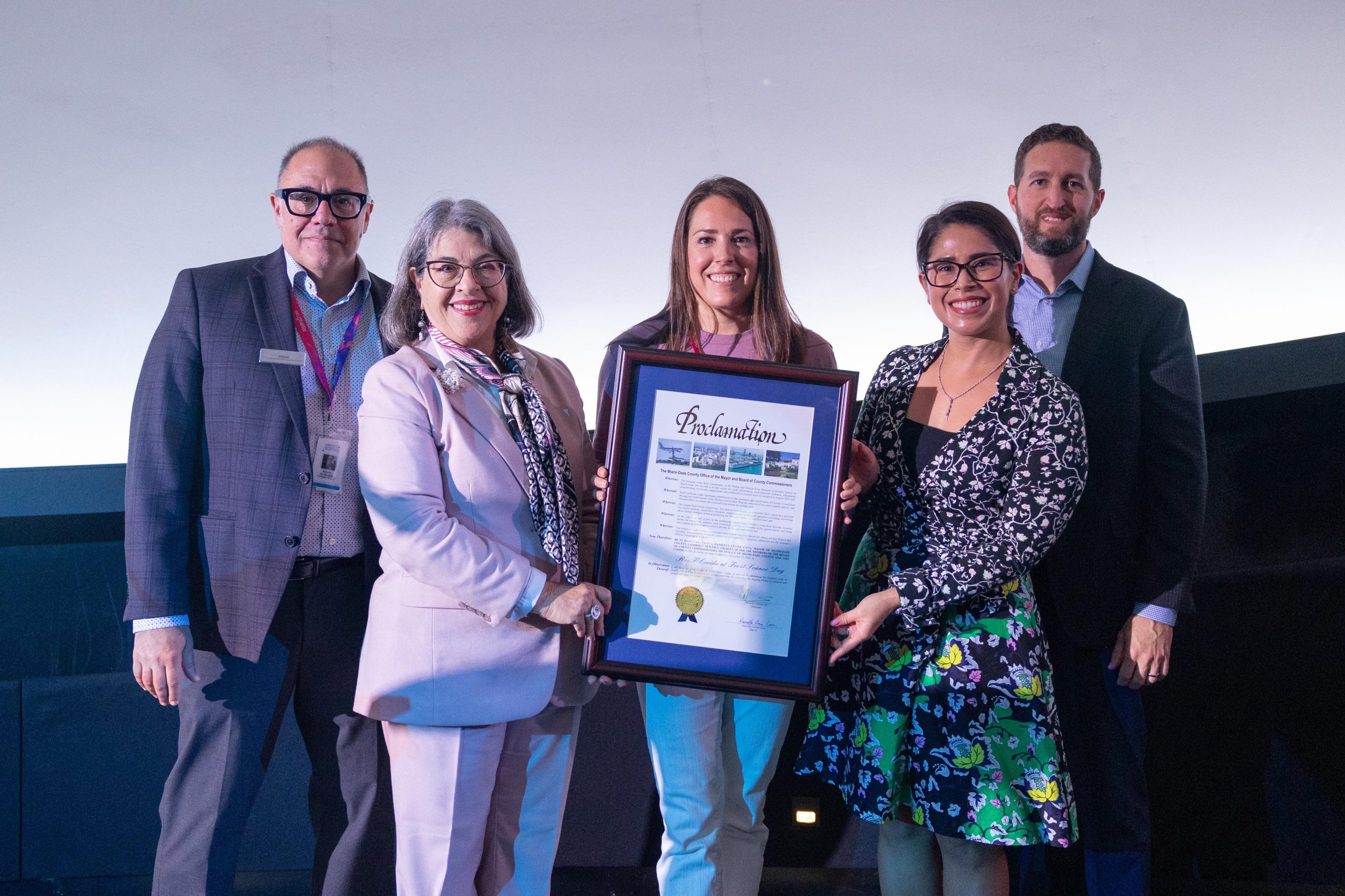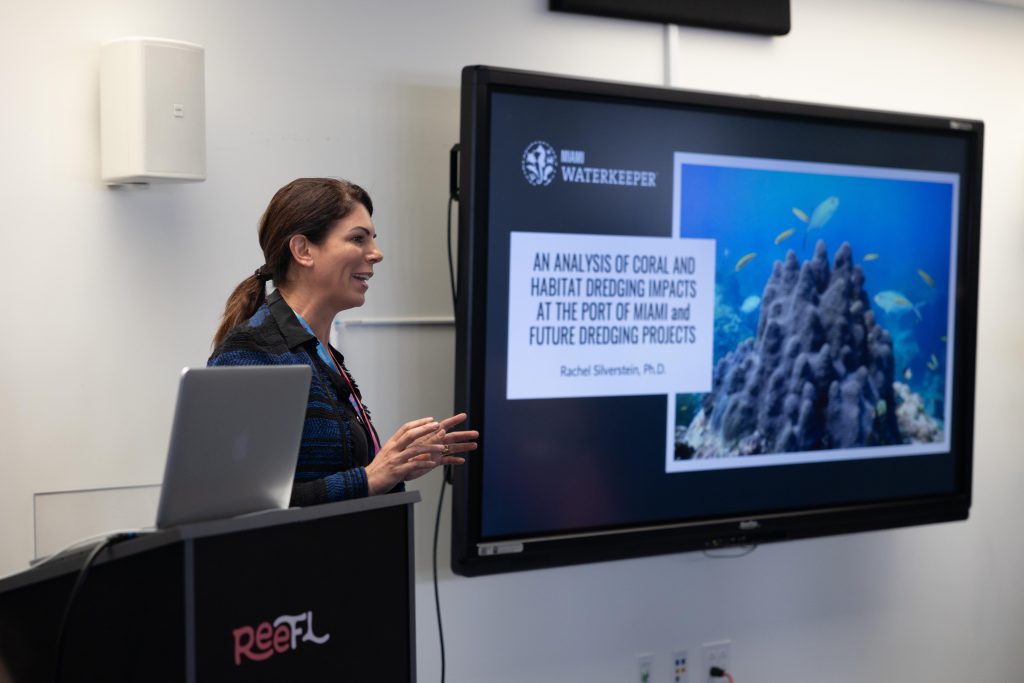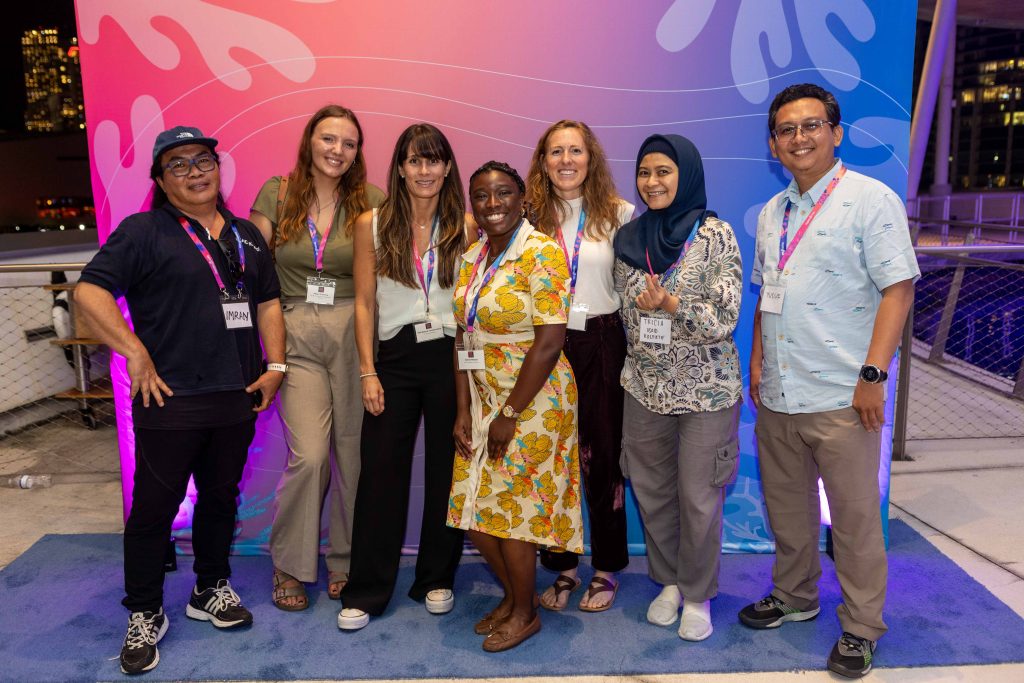
This story was also published on December 2, 2024 on The Invading Sea.
Florida’s Coral Reef, the 360-mile barrier reef that stretches along the state’s southeastern coastline, is one of Florida’s great natural treasures. It is also in danger from a myriad of threats: ocean warming, pollution and urban run-off, and disease, among others. Collaboration is key to solving these large-scale conservation challenges. However, there are few institutions that bring together the range of people needed to tackle them.
The ReeFLorida Symposium at Miami’s Phillip and Patricia Frost Museum of Science aims to fill that gap. ReeFLorida, formally the National Coral Reef Conservancy at Frost Science, is the museum’s multifaceted conservation initiative to protect Florida’s Coral Reef. Funded by NOAA’s Coral Reef Conservation program, ReeFLorida officially kicked off in January 2023.
The ReeFLorida Symposium is a keystone of the initiative, which also encompasses new exhibition content, coral care and research work, and educational programming. This multi-day meeting gathers scientists, restorationists, educators, and policymakers working to protect the reef.
After a successful inaugural symposium in 2023, this year’s event was held from November 12-15, 2024. Approximately 210 people from around the world, representing more than 70 institutions, attended. Alongside presentations and workshops, they were also treated to sweeping views of Biscayne Bay and the opportunity to explore Frost Science’s exhibitions and aquarium—a highlight for many of last year’s participants.
Bringing these scientists and practitioners together for productive conversations is a key goal of the ReeFLorida Symposium. “As a science museum, we have the unique ability to gather professionals from a variety of disciplines to talk about the future of Florida’s Coral Reef,” says Frost Science Senior Director of Conservation and symposium lead, Shannon Jones. “More than an ability, I’d say it is our responsibility. The symposium is one way we do that on a large scale.”
Two-time attendee Peter Auster, Senior Research Scientist at Mystic Aquarium and Research Professor Emeritus of Marine Science at the University of Connecticut, appreciates the event’s interdisciplinary nature and the sense that everyone is working toward a common purpose. “Having all of these people in the same proverbial room sets the stage for communicating current results, ideas, and fostering innovation,” Auster explained. He wasn’t alone in returning for a second year—more than 50 attendees from 2023 registered again this year.

This year’s symposium officially kicked off with a welcome speech by Miami-Dade County Mayor Daniella Levine Cava, who proclaimed November 13 “ReeFLorida at Frost Science Day.” Florida’s Chief Resilience Officer, Dr. Wesley Brooks, delivered the opening plenary. He gave an overview of state-level efforts for coral reef conservation and detailed the nearly $23 million the state has appropriated for coral propagation, recovery, and restoration in fiscal year 2024-2025.
The symposium’s other plenary sessions were equally insightful. Keri O’Neil, Director and Senior Scientist of the Florida Aquarium’s Coral Conservation Program, spoke on Thursday morning. The crowd murmured their admiration as her high-definition videos of coral spawning played in the Frost Planetarium, the coral eggs in the water column mimicking the star-filled galaxies that usually fill the planetarium dome.
Sarah Egner, Senior Vice President of Programs at MarineLab, rounded out the plenary line-up on Friday to spotlight the role of education in saving Florida’s marine ecosystems. “It is incredibly valuable to include educators in this type of symposium,” she commented afterward, noting that she hopes to see similar meetings follow suit.
Presentation sessions followed each day’s plenary talk. The symposium’s scientific program included 49 oral presentations and 12 posters spanning a wide range of topics—coral recovery paths, ex situ coral rearing, stony coral tissue loss disease, public engagement strategies, and even art—all related to Florida’s Coral Reef.
“Many other coral conferences have a more regional or global focus, and thus many of the strategies for coral protection or restoration that are presented do not necessarily apply to species and local issues in Florida,” said participant Xaymara Serrano, the Florida Fisheries Liaison for NOAA. The meeting’s focus on Florida was its biggest value, in her opinion.

This commitment to local issues was further highlighted by a Thursday afternoon panel discussion called Protecting Florida’s National Treasure. Panelists Loren Parra, Chief Bay and Water Resources Officer for Miami-Dade County; Katelyn Armstrong, Senior Environmental Analyst – Reef Coordinator for Palm Beach County; Mayor Holly Merrill Raschein of Monroe County; and Angela Delaney, Marine Resources Environmental Program Manager of Broward County highlighted some of the ongoing county-level work to protect Florida’s Coral Reef. Miami Herald lead climate reporter, Alex Harris, moderated the discussion.
“This panel was a great opportunity to give symposium attendees insight into what our county governments are doing to protect Florida’s Coral Reef,” said Frost Science External Affairs Manager Maria J. Espinoza, who organized the session. “Understanding this helps scientists and conservationists better target their own efforts.”
The symposium also aimed to equip attendees with new skills through afternoon workshop sessions. Workshop topics this year included partnership building with Miami-Dade County Public Schools, scientific and conservation permitting, grant writing, and leveraging social media for impact. Topics were chosen based on feedback from last year’s participants.
While many symposium components were geared toward attendees, the museum welcomed the public for a special ReeFLorida-themed LIVE@Frost Science on November 13. WPLG Local 10 News Miami anchor, reporter, and passionate environmental advocate Louis Aguirre took the Frost Planetarium stage to highlight the role—and responsibility—of news media to raise awareness about environmental issues.
Aguirre’s popular and successful “Don’t Trash our Treasure” series has tackled topics like coral bleaching and plastic pollution. Teaming up with local scientists, Aguirre brings accurate, relevant, and sometimes emotional reporting about the ocean to viewers. He has won multiple Emmy awards for this work. Unsurprisingly, he left the LIVE@Frost Science crowd motivated to act, fielding multiple audience questions about what they can do to protect Florida’s natural environment.
In all, the 2024 ReeFLorida Symposium was huge success—and Florida’s Coral Reef, hopefully, will continue to reap its benefits far into the future. Dana Wusinich-Mendez is the Atlantic and Caribbean Team Lead for NOAA’s Coral Reef Conservation Program, who fund Frost Science’s ReeFLorida initiative. She says the recently reauthorized Coral Reef Conservation Act calls on NOAA to facilitate continued and enhanced partnerships between federal, stage, and local agencies.

“The ReeFLorida Symposium provides a great venue to build and support these partnerships here in Florida,” Wusinich-Mendez remarked. “I want to thank our colleagues at Frost Science for their vision and leadership in developing this platform where the coral reef science, education, and management communities can come together to share knowledge and plan for the future of Florida’s Coral Reef.”
While funding for the ReeFLorida Symposium only lasts through 2025, Jones’s team is already planning and seeking sponsorship opportunities to continue this event long into the future. “Based on participant feedback and the conversations we have been part of, we know the symposium is so important to Florida’s coral community. We are striving to keep it going past 2025,” she said.
Peter Auster echoed Jones’s sentiments about the Symposium. Reef ecosystem conservation and restoration involves “herculean efforts by many people,” he observed. Not only does it require we pay attention to what is happening to the corals, but also that we protect the watersheds that flows out over the reefs and all the biodiversity they contain. However, Auster noted: “We cannot win if we don’t play.”
Photo captions:
- (from left) Frost Science President and CEO Dr. Doug Roberts, Miami-Dade County Mayor Daniella Levine Cava, Shannon Jones, Loren Parra, and Dr. Wesley Brooks commemorate November 13, 2024, as ReeFLorida at Frost Science Day.
- The Protecting Florida’s National Treasure panel in the Frost Planetarium highlighted work being done by four South Florida counties to conserve Florida’s Coral Reef.
- Miami Waterkeeper and Chief Executive Officer, Dr. Rachel Silverstein, delivers a presentation during the ReeFLorida Symposium.
- ReeFLorida Symposium attendees pose for a picture during an evening networking event.
All images credit to Frost Science.